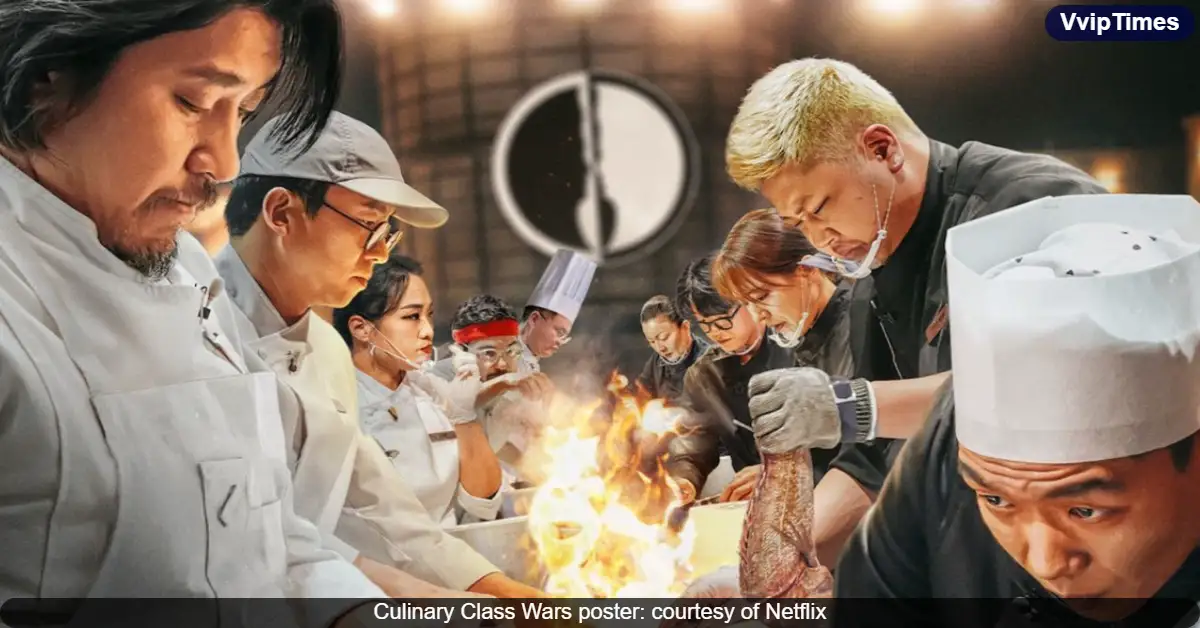Culinary Class Wars Synopsis
Name: Culinary Class Wars
Premiere Date: 17 September, 2024
Cast: Paik Jong Won (Baek Jong Won), Anh Sung Jae
Director: Kim Hak Min, Kim Eun Ji
Writer: Mo Eun Seol
Episodes: 12
Genre: Reality TV, Cooking Show
Language: Korean
Platform: Netflix
Also known as 흑백요리사: 요리 계급 전쟁 (Black and White Chef: Culinary Class Wars), Netflix’s cooking reality show features two teams, The White Spoons and The Black Spoons, competing in a culinary battle. The teams represent two social classes: The White Spoons, experienced chefs, and The Black Spoons, relatively unknown chefs vying for recognition. With 100 chefs in total and a grand prize of 300 million KRW, the show injects fresh energy into the Korean cooking scene.
What Worked for Culinary Class Wars
Cooking Shows Redefined: Korean cooking shows have gained global popularity, but Culinary Class Wars successfully sets itself apart. With a concept reminiscent of MasterChef and Hell’s Kitchen, it introduces an exciting battle between professionals and amateurs. The drama, combined with a deep dive into Korean cuisine, keeps the audience hooked. The show’s competitive format and high stakes add extra layers of tension and thrill to each episode.
Diverse Chefs: The show features a wide range of chefs, from a Michelin-starred chef to a comic book-inspired chef. This dynamic cast, coupled with fresh local ingredients, showcases the diversity and richness of Korean food. The balance between global cuisines and local flavors makes it highly engaging for an international audience.
Unexpected Moments: One highlight was Napoli Matfia’s winning dessert dish, created from simple, easily accessible ingredients. This creative use of minimal resources impressed both the judges and viewers, leading to a commercial release of the dessert. Such moments added an unexpected twist and drew attention to the real-world application of dishes created on the show.
What Didn’t Work for Culinary Class Wars
While Culinary Class Wars has been praised globally, a few areas drew minor criticism:
Casting Decisions: Some fans were disappointed by the limited screen time for renowned chefs such as Ahn You Seong and Lu Chinglai, leading to frustration. Chef Kang Scott, who placed third, also received minimal post-elimination commentary.
Rule Changes: At times, the sudden shifts in rules confused both contestants and viewers. A lack of detailed explanations, especially during eliminations, left some viewers frustrated with the overall flow of the competition.
How Were the Judges?
Paik Jong Won (Baek Jong Won) and Anh Sung Jae led the judging panel, both well-respected figures in the Korean culinary world. Baek Jong Won’s experience in home-style cooking and his balanced critiques provided fair assessments throughout the show. Anh Sung Jae, South Korea’s only 3-star Michelin chef, offered a contrasting judging style. Known for his meticulous standards, his participation added a layer of intensity to the competition. Their chemistry as judges was refreshing, particularly in a format where high standards are the norm.
Overall Culinary Class Wars Review
The Reality Show Edge: While the final episodes stirred up debates, the unpredictability of a reality show makes such twists inevitable. Some viewers questioned the fairness of the finale, which pitted one White Spoon chef against one Black Spoon chef. However, this fitting showdown played perfectly into the thematic narrative of the series. The show even brought shocking moments, such as Chef Choi Hyun Seok’s elimination for neglecting to use garlic in the quarterfinals. His grace upon leaving the competition only added to the allure of the series.
In many ways, Culinary Class Wars draws comparisons to Physical: 100 by blending high-stakes competition with a cultural showcase. The blend of local ingredients, high-profile chefs, and unexpected outcomes gives the show a unique flavor that stands out in the ever-growing world of K-content.
Keep an eye on VvipTimes, and allow notifications from us to let you know the latest developments about Culinary Class Wars.































